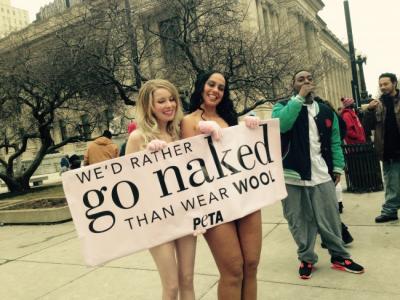“Luxury Italian wool” not as ethical as presumed

ROME – Research shows that the majority of products claiming to be of “Italian wool” are in fact wool from foreign sheep farms, which do not conform to ethical standards of animal treatment, officials from an animal rights group report.
PETA (People for the Ethical Treatment of Animals) have launched a campaign to raise awareness of the unethical treatment of sheep in countries such as Chilli, which often, unbeknownst to the consumer, are the providers of the majority of “Italian” wool.
The organisation has published videos and images on line of the shocking treatment that the animals have to undergo, including gruesome footage of workers slitting the throats of the sheep and leaving them to die slowly, and physically abusing the animals with kicks before skinning them alive.
The shocking revelations of the all too common animal treatment in these large farms which provide the bulk of wool to clothing and accessory manufacturers across the globe, have caused an immediate response in the USA, where Brooks Brothers, a well known clothing company, have decided to stop importing wool from these suppliers.
PETA, which has written as part of it’s motto “animals are not ours for use in clothing”, have reported that as little as one percent of wool worldwide comes from sheep that have been raised and sheared in Italy. Instead the organisation claims that the true origin of so-called “Italian wool” is more often than not, from countries such as Chilli, which exports at least 30 percent of the wool that it produces to Italy.
The director of PETA, Mimi Bekhechi underlined the gravity of the misconception saying “When a product claims to be “luxury” Italian wool, the sheep that are mutilated, beaten-up and cut in to pieces, one in front of another, are the ones that are paying the highest price”. Those heading this awareness campaign within the organisation, ask the consumer “to spare a thought of the sheep, which are being abused all over the world, by making the choice to wear clothing that does not derive from animal sources.”
In less than two years, thanks to PETA’s creation and distribution of six videos to 39 organisations worldwide, the unethical treatment of these sheep, has been brought to the forefront of people’s attention across three continents. Those directing the campaign hope that the shocking nature of the published material will continue to create an ever-larger impact on the consumer, resulting in a significant reduction and eventual elimination of this ethically unacceptable treatment of sheep.
DT


